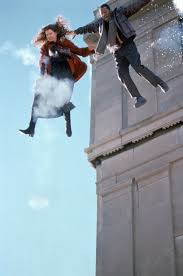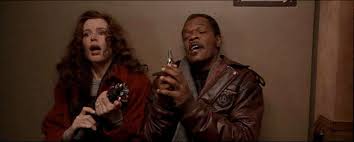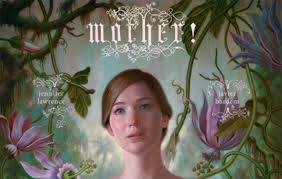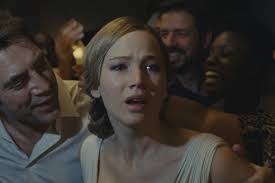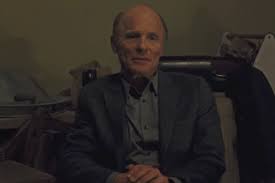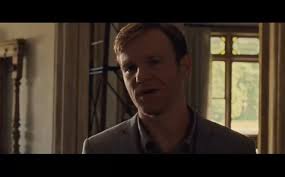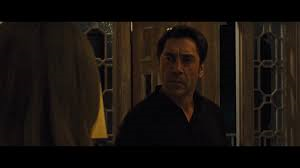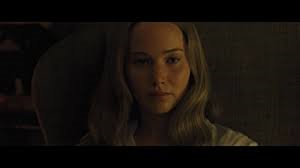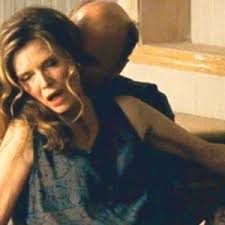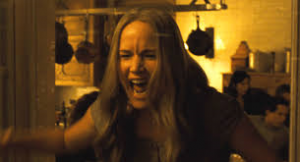SHORT TAKE:
A rare example of a wildly successful, female-lead, action adventure about MOTHERHOOD — for adults only.
WHO SHOULD SEE IT:
Any adult who enjoys James Bond or one of the reboot Mission Impossibles.
LONG TAKE:
With the quality-questionable Uncle Drew being the most promising of the new movie releases this week, I thought I might do a review of one of my favorite movies you've probably never heard of: The Long Kiss Goodnight.
In 1996, far before 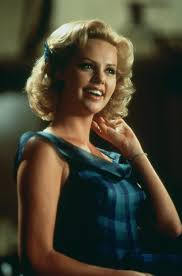 Charlize Theron became
Charlize Theron became  Atomic Blonde, and back when Scarlett Johanssen was still a child,
Atomic Blonde, and back when Scarlett Johanssen was still a child, 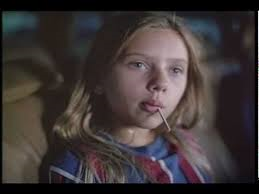 starring in low budgets like Manny and Lo, well before she grew up to be
starring in low budgets like Manny and Lo, well before she grew up to be  Black Widow, a unique cinematic excursion was released called The Long Kiss Goodnight.
Black Widow, a unique cinematic excursion was released called The Long Kiss Goodnight. 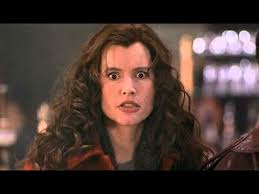 Geena Davis, from Stuart Little, A League of Their Own, The Fly, and Beetlejuice costarred with the truly ubiquitous and eternally young
Geena Davis, from Stuart Little, A League of Their Own, The Fly, and Beetlejuice costarred with the truly ubiquitous and eternally young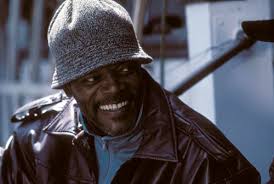 Samuel L Jackson (who looks no different now than he did 22 years ago – see my comment about this in my review of The Incredibles 2) in a movie about a woman named Samantha Caine. Samantha washes up, two months pregnant, on the shores of Honesdale, PA, a sleepy New England town, with nothing but clothes on her back she doesn't remember buying, a few fighting scars and complete "focal retrograde amnesia". She remembers nothing about herself: not her identity, where she came from, her age, who the father of her child is, nothing, except her name and even that is a guess.
Samuel L Jackson (who looks no different now than he did 22 years ago – see my comment about this in my review of The Incredibles 2) in a movie about a woman named Samantha Caine. Samantha washes up, two months pregnant, on the shores of Honesdale, PA, a sleepy New England town, with nothing but clothes on her back she doesn't remember buying, a few fighting scars and complete "focal retrograde amnesia". She remembers nothing about herself: not her identity, where she came from, her age, who the father of her child is, nothing, except her name and even that is a guess.
Honestly, the background pictures during the opening credits reveal WAAAAY more than they should or is necessary. So – if you rent or buy this movie, on first viewing, you should START AT THE THREE MINUTE MARK. You can go back and watch the opening credit images after you have finished the movie.
 Eight years later, as the movie begins, Samantha is now a teacher in the local elementary school and a devoted mother to Caitlin. While riding in her adopted home town's Christmas parade, in what seems to be a complete non-sequitor, an inmate in a nearby prison, watching the event on a caged TV, suddenly goes into a fury. About the same time, Mitch, (Samuel L Jackson) the low rent detective Samantha hired then forgot about, unexpectedly comes up with a lead, and
Eight years later, as the movie begins, Samantha is now a teacher in the local elementary school and a devoted mother to Caitlin. While riding in her adopted home town's Christmas parade, in what seems to be a complete non-sequitor, an inmate in a nearby prison, watching the event on a caged TV, suddenly goes into a fury. About the same time, Mitch, (Samuel L Jackson) the low rent detective Samantha hired then forgot about, unexpectedly comes up with a lead, and 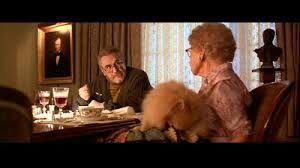 Nathan (Brian "Stryker" Cox), an old friend from Samantha's past, sets out to find her.
Nathan (Brian "Stryker" Cox), an old friend from Samantha's past, sets out to find her.
With the exceptions of Ms. Theron, Ms. Johanssen, and Gal Gadot, I generally find that action adventures featuring women protagonists fall pathetically flat. 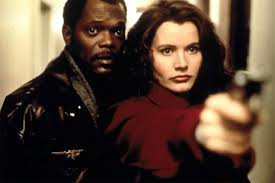 The Long Kiss Goodnight is the Gold Standard of exceptions and the predecessor to all the blockbusters in which the aforementioned ladies have starred.
The Long Kiss Goodnight is the Gold Standard of exceptions and the predecessor to all the blockbusters in which the aforementioned ladies have starred.
Clever, rough, violent, funny, startling and profane, it is one of the most unusual, fascinating and memorable films about motherhood I know. It ranks right up there with Hotel Artemis (click to check out my previous blog) and Aliens. While the language, ironically, has even Mr. Jackson's character, Mitch, complaining, there is no blasphemy, and the sexuality is very low key for this genre. If you want to check the details of profanity and sexuality out for yourself click Screenit, if you are a member, before watching.
GENTLE SPOILERS
 Geena Davis' slow transition
Geena Davis' slow transition 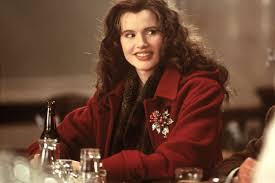 from the sweet and charming,
from the sweet and charming,  happily domestic
happily domestic 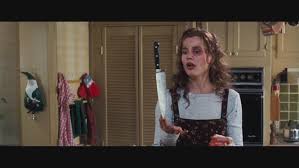 Samantha to the
Samantha to the 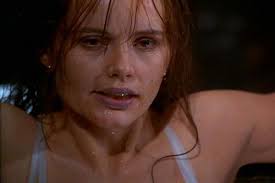 fierce and indomitable
fierce and indomitable  Charley is a tour de force.
Charley is a tour de force. 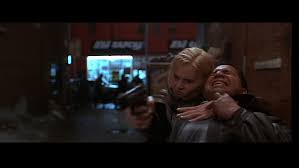 Ms. Davis and Mr. Jackson make superb platonic team mates
Ms. Davis and Mr. Jackson make superb platonic team mates 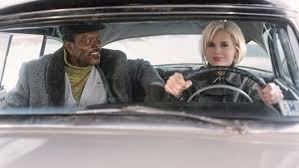 in the kind of movie relationship usually reserved for bromances. The plot is part James Bond, part North by Northwest, part Mission Impossible, with a little bit of Dr. Jekyl/Mr. Hyde thrown in for good measure.
in the kind of movie relationship usually reserved for bromances. The plot is part James Bond, part North by Northwest, part Mission Impossible, with a little bit of Dr. Jekyl/Mr. Hyde thrown in for good measure.
One of the things I find most commendably endearing and notably rare about this movie in general, and Samantha in particular, is that there is not even a hint she ever considered killing her unborn child, despite the desolateness of her situation as Samantha. Even while Charley, the most unlikely of mother candidates, lurks in her subconscious, she has and embraces her natural and powerful maternal instincts. And after re-embracing her distinctly ungentle previous life Samantha/Charley remains a profoundly dedicated mother. 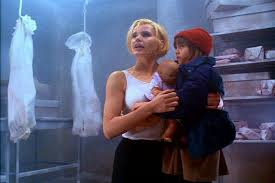 The idea that motherhood would trump everything else,
The idea that motherhood would trump everything else, 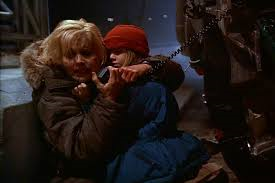 even for the fully re-realized Charley, is a truly inspiring thought.
even for the fully re-realized Charley, is a truly inspiring thought.
MODERATE SPOILER
 To the point about motherhood, one of my favorite all time movie scenes is the way Samantha/Charley protects Caitlin and handles the "One Eyed Jack" when he invades her home. That's a heck of a mom. I can picture Weaver's Ripley giving Samantha a standing "O".
To the point about motherhood, one of my favorite all time movie scenes is the way Samantha/Charley protects Caitlin and handles the "One Eyed Jack" when he invades her home. That's a heck of a mom. I can picture Weaver's Ripley giving Samantha a standing "O".
So if you're in the mood for something different than your usual film fare, be sure the kids are in bed and no where near close enough to hear Mr. Jackson as he chides Charley for HER language, and cue up The Long Kiss Goodnight.